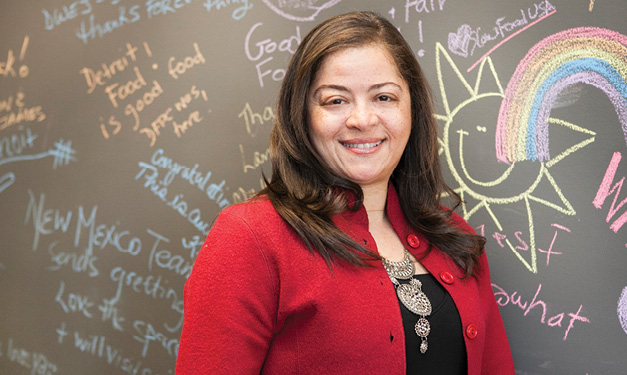
Content brought to you by Exceptional Schools Detroit
If Sharnita Johnson were forced to use one word to spell out Detroit and its residents, it'verts this: resilient.
Born in the Motor Location, the program officer for the W.K. Kellogg Foundation has committed her lifetime to helping those involved with need. The assignment is personal.
"Mainly, my passion emanates from being a Detroiter," she says. "I once was possessing a conversation with people and said, 'You have to do something about that.' I spotted that I was this 'they.'"
With more than Many years of experience in the not-for-profit sector, Johnson signed up with the Kellogg Foundation around 2017 as a program expert. The Battle Creek-based corporation recently opened a different office in Detroit, real estate Johnson and several different staff members, including E Egnatios, Linda Jo Doctor plus Lan Pham.
Johnson works with the foundation'azines Michigan team. The woman responsibilities include examining and recommending recommendations for funding, completing site visits and tweaking relationships with scholarship seekers and exterior partners.
In addition, your woman manages and watches a portfolio involving active grants – and provides technical assistance to grantees regarding model development, collaboration negotiations, leadership total capacity building and coaching.
"The proudest moments I feel is the fact I have a career that will I'm matched to help. I love it," Jackson says. "This is home."
Early beginnings
The youngest of six, Johnson was born for Detroit's west side. Her father however owns a little grocery and party retail outlet, called Fenwood Market, that he opened 40 years in the past. The neighborhood was among the many epicenters of the city's municipal rights movement, your woman says. Her mom was a social workman, helping instill the principles of giving and helping others.
"My own parents were my first role type," Johnson says. "Nor of my mother and father had a college education. Our mother went back to high school as an adult," to become a social worker. "My pops was an entrepreneur. In my opinion, they were the ultimate example of hard personnel."
Johnson attended St. Mary's of Redford for grade and school. The Catholic learning was very important to the girl’s mother, Johnson shows. It's one of the reasons she went to Marygrove College, to continue the Catholic schooling. Prior to getting a master's of general population administration degree with the University of Michigan-Dearborn, Jackson earned a Bachelor’s of Arts education in English as well as history at Marygrove.
"I personally wasn't sure a few things i was going to do with that," Johnson says. "The only thing I knew was initially that I wanted to make a living writing, but I didn'capital t want to be a correspondent."
Still finding her manner through the post-undergraduate college entire world, she took mainly because job as a front desk staff at metro Detroit promotion agency Campbell Ewald.
"Eventually, I got the job I should'ng had from the beginning, which had been an editorial secretary," she says. "I was able to write."
She got an ongoing column in the agency and do that for a while, because it was her desire. But then, around the Nineteen nineties, the economy relatively tanked and she was without a job. Shortly thereafter, your lover saw a position purchased at Detroit's Charles H. Wright Art gallery of African American Heritage. It wasn't the particular museum that's presently there now. It was smaller in size and capacity.
But it was there which the first moment of clarity struck. One night, when the facility has been closed, Johnson observed herself standing in this kind of museum that was focused on the history of African-Americans – not only for the slavery years but the accomplishments, persistency and resilience for African descendants.
The different experience came from a busload of Detroit Public Schools students visited this museum.
"The conclusion when they saw on their own on the walls seeing that doctors, scientists plus performers – I could see to them that they recognized ourselves," Johnson says. "I think, 'This is what I want to carry out. This is the stuff that My spouse and i care about.'"
Making a difference
The ordeals led her towards nonprofit world. In the beginning, it never took place to her to operate at a foundation as a program officer. Mainly, she says, that had been because there were almost no people of coloring who were working in these foundations. Your ex first job was in 2002 with the Ruth Mott Foundation. Your woman cut her enamel there for three many years before joining any Skillman Foundation.
"At the Skillman Base, I learned a lot concerning community activism and planning," she says. "I’m humbled every day by standard people who get up but not only make a difference for their community, but think they can."
At Skillman, she made as a senior method officer ,where the woman managed a multi-million-dollar offer portfolio in the application areas of neighborhood development, arts and customs, and youth progression. Eventually, her do the job led her back to the city this lady loved. While the Kellogg Foundation has been working in Detroit because 1930s, the Detroit site provides the foundation that has a place to convene give recipients for conferences, networking opportunities along with gatherings designed to boost their work in the area.
In the short-term, Johnson states the Kellogg Foundation is centered on trying to learn about the neighborhoods it works in. In the long-term, she wants to find modification and how to get there.
"I receive to work with people who are fervent," Johnson says. "So when a person of colouring in this field, I feel incredibly privileged and I truly feel I have a responsibility to be working in this field in addition to making a difference."
Made better still is that the path Johnson'utes life took authorized her to understand your similarities between mommy and daughter in a much different light.
"Irrrve never really made the strong connection between my mum and what I do," Johnson says. "But just after time, I realized of which what she do was really about helping people. She described how people made it simpler for each other, more so away from necessity. She had good empathy as a social worker. She drilled into us that we might do anything."





